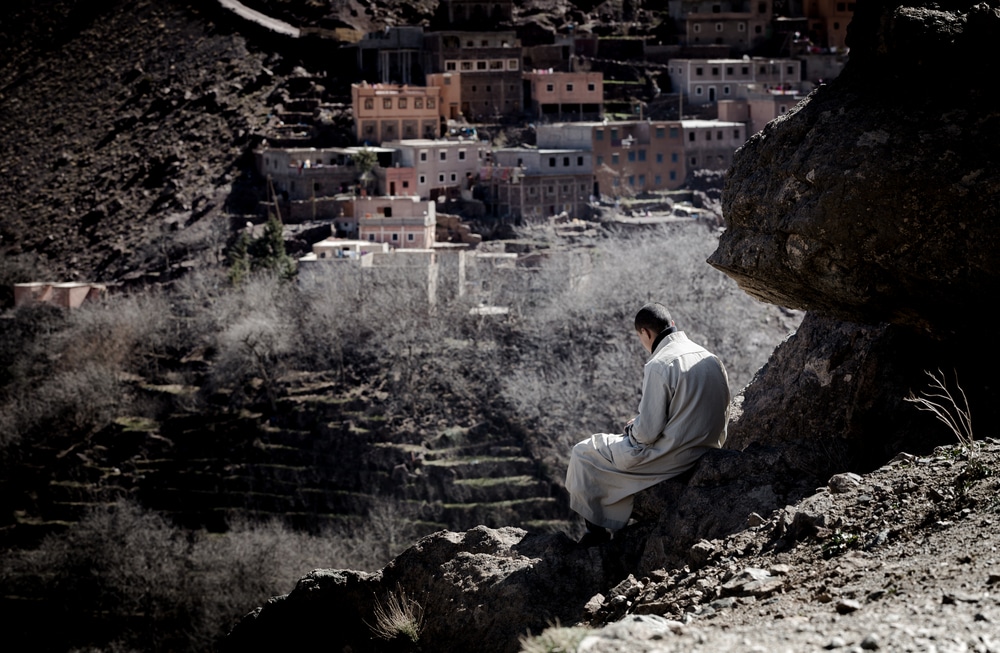#Current Affairs
Closing Mosques – Islamic Justifications for Coronavirus Lockdowns

Published

This piece is cross-posted with permission from islam21c.com.
We are living in an unprecedented time. Superpowers have become overwhelmed by the tiny virus particle Covid-19, turning bustling metropolises into ghost towns, grounding planes and closing airports, with hundreds dying daily and some of the most advanced healthcare systems in the world grinding to a halt.
This unprecedented situation has led to the unprecedented move of the world’s mosques being closed to the public for the first time—en masse—since Bilāl (Allāh be pleased with him) first raised the call to prayer over 1400 years ago. It is indeed a sign of Īmān for this to hurt us, as the believers are connected to the Houses of Allāh, and their closure has stirred many emotions.
Keep supporting MuslimMatters for the sake of Allah
Alhamdulillah, we're at over 850 supporters. Help us get to 900 supporters this month. All it takes is a small gift from a reader like you to keep us going, for just $2 / month.
The Prophet (SAW) has taught us the best of deeds are those that done consistently, even if they are small. Click here to support MuslimMatters with a monthly donation of $2 per month. Set it and collect blessings from Allah (swt) for the khayr you're supporting without thinking about it.
It is important in times like these not to let these emotions get hijacked by Shaytān, who has tried to use the Coronavirus pandemic to sow seeds of discord among the Muslims. One of the most insidious traps of Iblīs is to cause us to lose respect and love for each other, particularly for the scholars and leaders of our communities, thereby blocking the mercy of Allāh from reaching us.

The closing of a masjid is a matter of local jurisdiction. My personal opinion, one way or another, is not relevant in a matter that is up to responsible, knowledgeable scholarship in respective regions to decide based on their own scenarios. I could in fact be sinful for commenting on a specific decision taken by the leaders of a specific congregation, and even more sinful if my comments create unnecessary drama between congregations and their leaders.
However, I have been inundated with questions and arguments about the situation, from people for and against the closure of mosques, and I believe it would be beneficial for all of us to understand the matter at hand, to foster understanding of the reasoning behind the closure of mosques taken by scholars across many countries, and to highlight the fact that the scholars who hold different views are in fact in agreement on the major principles involved.
Furthermore it is important to appreciate that the decision to close mosques was a decision WITHIN the Islamic legal field, not due to the false dichotomy some have spread of the ‘medical’ vs ‘Islamic’ considerations. People with a particular interest or expertise are naturally inclined to giving that disproportionate weight. However, as we will see, the Islamic jurist in fact has to take into account ALL relevant angles—which is partly why there is more scope for disagreements—including the medical, economic, mental health, spiritual, political and hereafter angles.This is thus a delicate ijtihādi matter juggling various competing considerations, which should attract from us the highest level of adab (manners).
There is more agreement than disagreement
Both those who opined for and against full closure of mosques agree that an objective of the Sharia is the preservation of life. They both agree on the principle that prevention of harm takes precedence over gaining benefit. They both agree that out of two necessary harmful choices, one has to choose the lesser of two harms to avert the greater one.
They both agree that Allāh has gifted this ummah the unique gift of the entire earth being pure and a place of prayer in general, with certain places attracting more reward than others. They both agree that closing the masjid is no small matter, but a massive, catastrophic one.
They both agree that if you follow scholarly opinions of trusted scholars and scholarly bodies, you will not be sinful. And they both agree that if you are prevented from your usual ‘ibādah such as praying in the mosques, you will still be rewarded for them.
It is important to remember this, because we naturally ignore the majority area of agreement and focus on relatively small matters of disagreement. But why do those disagreements occur?
Differences occur in the micro-matters; of juggling the various ethical considerations (masālih), their respective implementation in real life, and the analysis and weighing of various harms—whether ‘major’ or ‘minor’, for example. Scholars differ due to their personal reasoning and understanding, since Allāh has created us all with different personalities and dispositions, so we naturally interpret a situation in different ways.
This is partly why large-scale decisions should be made by numbers of jurists coming together, mitigating each other’s variations, the pinnacle of which is Ijmā’ (unanimous consensus), which is a binding proof of what Allāh intended to be said on His behalf on any given matter. In any case, broadly speaking, where there is no unanimous consensus, we should not be overly dogmatic or rigid when it comes to accepting legitimate disagreements.
Arguments for closing mosques
The following are some of the Islamic justifications of the decision to close mosques en masse by scholarly bodies in several Muslim-majority countries.
Hadiths of avoiding spread of disease
The Prophet (peace and blessings be upon him) is reported to have said:
“If you hear of a disease outbreak in a land, do not go there, and if you are there during an outbreak, then do not flee from it.”[1]
“The afflicted should not be mixed with the healthy.”[2]
“Flee from leprosy like you would flee from a lion.”[3]
When it comes to prophetic instructions, one of the first things the jurist does is try to ascertain whether it is: (i) intended literally as an act of obedience (ta’abbudi), such as maghrib being prayed three rak’āt or circumambulation of the ka’ba being anti-clockwise; or (ii) intended as a fathomable means to an end (ma’qūl al-ma’nā), such as the prohibition of wine being due to its capacity for intoxication.
When it came to narrations like the above, the scholars understood them to be of the second category, that the Prophet (peace and blessings be upon him) is in fact giving those as examples of means to an underlying end—or causative effect (‘illah)—which is to isolate infectious diseases and limit their harms.
As such, if the World Health Organisation were to send people into an infectious disease outbreak zone whilst taking precautions to limit its spread, the jurist would not say this is impermissible due to the hadith of the Prophet (peace and blessings be upon him). Even though they may be going against the literal instruction of the Prophet (“do not go there”), they are taking steps to prevent the intended meaning behind the hadith—i.e. to limit the spread of the disease.
This is why in the books of fiqh we find many examples of scholars giving rulings that on the face of it go against a particular hadith of the Prophet, but upon closer inspection they are actually being faithful to the intended meaning behind the Prophet’s instruction. An example is found in child custody cases. The Prophet (peace and blessings be upon him) declared that in cases of a divorce, a small child should remain with the mother, and if she remarries then custody goes to the child’s father.
Despite the wording of the hadith, some scholars understood that this is based on an underlying ‘illah (effective cause), which is to prevent the child being neglected by a step-father or a mother busied with looking after another family. As a result, in cases where the father of the child is more likely to neglect him or her, and the step-father permits the child’s mother to nurture her child, scholars opined that the mother retains custody after remarrying, in spite of the wording of the prophetic hadith whilst being faithful to the underlying meaning transmitted by the Prophet (peace and blessings be upon him).
Therefore, the jurists agree that the intended meaning behind the narrations above is to prevent or limit the harm caused by a disease, because the Sharia intends to preserve and protect life—including health. Since the coronavirus not only infects a large number of those who come into contact with it, but leads to death and secondary and tertiary disasters such as the overwhelming and destruction of public health service capacity, the Shariah thus instructs us to do what is possible in order to prevent it and limit its harms.

Conflicting Sharia objectives: Life vs Dīn (Faith)
A problem however occurs when this objective to preserve life, conflicts with another objective of the Sharia—namely to preserve the Dīn of Islām.
Medical experts have expressed the fact that the distance between you and the coronavirus is a simple handshake. Extreme Social distancing mechanisms have been implemented across many countries, and the deadly cost of delaying these measures has been seen in countries that adopted these measures after the disease started to spread more rapidly, such as Iran and Italy.
On one hand we have the call for social distancing, but on the other, the masjid wants us together; feet to feet, shoulder to shoulder. Will praying our five daily prayers and the Friday prayer in congregation lead to the virus spreading death and destruction of the public health services? The medical and epidemiology experts give us an overwhelming ‘yes’ to this question.
According to those scholars who opined to close masājid, the testimony of those experts reaches the threshold of ghalabat al-dhann—a warranted confidence in some information that the jurist will be held accountable for knowing, and thus anticipating. The medical experts have thus advised with a degree of confidence that we are responsible for anticipating, that things like Umrah and congregational prayer will indeed lead to the spreading of the virus.
But is that enough to close mosques?
Knowing that something is a potential threat to life is not automatically enough to trump any other consideration. The Sharia has, after all, legislated Jihād, which can and does lead to the loss of life. The key to understanding this is the following.
The Sharia has overall objectives that have been extracted by the scholars of Islamic law, from a holistic, inductive reading of all rulings (istiqrā’). There are various formulations, but they include the preservation of the Dīn, life, lineage, mind, wealth, and reputation.
Not just due to the fact that the Sharia has commanded things like Jihād, the scholars have understood that as an abstract objective or value, the preservation of the Dīn takes precedence over the preservation of life. However, before this can be implemented in the process of law and deriving rulings, it has to be resolved across a second dimension.
Each objective of the Sharia is broken up according to how necessary any given thing is to that objective.
A Darūra is something that is absolutely necessary to preserve that objective, its absence causing a detrimental impact on that objective. An example of this is not praying the Salāh at all, which is a Darūra for preservation of one’s Dīn.
The next level down is a Hājah, which is something you need to fulfil an objective, its absence causing hardship, but not necessarily detriment. It may lead to detriment down the line, but not immediately. An example of this is having a roof over your head, to preserve life. Not having it will be very difficult, but not an imminent threat to your life.
The third level the jurists mention is a Mukammil, which is something under normal circumstances neither necessary nor needed, but something that will assist you in achieving one of the objectives, sometimes translated as “embellishment”.
Scholars who gave the fatwa to close mosques cited that the congregational prayer falls into this third category, it is a Mukammil matter, not a Darūra nor a Hājah (under normal circumstances).
Performing the prayer in congregation assists a person in carrying out the prayer, therefore fulfilling the objective of preservation of the Dīn. If a person does not pray in congregation but still prays, he is able to preserve his Dīn. It will not be immediately detrimental to his Dīn and its preservation.
The faqīh therefore does not simply look at one dimension—Dīn vs life—but rather he looks at them combined with the second dimension, of necessity. Whilst the Darūra actions of preserving the Dīn trump the Darūra of preserving life (such as in warfare), the Darūra actions of preserving life (such as social distancing) trump the Mukammil actions of preserving Dįn (such as Ādhān and congregational prayer).
It is important to note that this is from within the Islamic legal paradigm. It is not an ‘Islām vs medicine’ or ‘dunyā vs ākhira’ binary—these are false dichotomies. From within Islām’s own legal framework, it is a religious obligation to carry out certain actions to preserve life and wealth, for example. If the mu’adhin feels (with ghalabat al-dhann) that going up a hill to give the call to prayer will lead to him getting robbed, for example, then he is told by the Islamic jurist to make the call from a safe place, even if no one will hear it. There is no guilt on him, in fact he may be rewarded for following this Islamic ruling.
What about Jumu’ah?
With regards to the Friday prayer, these scholars likewise opined that stopping it will not lead to the erosion of Dīn because the Sharia has given a replacement for it, in the form of the Dhuhr prayer, where it is not possible to observe the Friday prayer. It does not constitute an imminent threat to the preservation of the Dīn because Allāh has given a replacement (badal) for it, and there is a maxim in Islamic law that “When the default is excused, the replacement is moved to.”
Other general evidences
In addition to the above, those who opined to close mosques on account of the coronavirus outbreak refer to other supporting evidences. Among them are the statements of Allāh:
“And Allāh wants to lighten for you [your difficulties]; and mankind was created weak.”[4]
“And strive for Allāh with the striving due to Him. He has chosen you and has not placed upon you in the religion any difficulty.”[5]
“And do not throw yourselves into destruction with your own hands…”[6]
Among them is the legal principle “Harm must be removed,” which is taken from the hadith of the Prophet (peace and blessings be upon him), “There should be no harm nor the reciprocation of harm.”[7]
Those who were against the closure of mosques
It is important to remember that despite the dominant discourse in the public mind being a false dichotomy between absolute lockdown on one hand, and business as usual on the other, those scholars who opined that mosques should not be closed en masse did NOT argue for simply doing nothing, as some have misunderstood.
It is true that some people without knowledge have taken a condemnable course of action of being negligent with regards to their responsibilities to limit the harms of this virus—which is as we have explained an Islamic obligation. What is more condemnable is using the great Islamic value of Tawakkul (reliance on and trust in Allāh) as an excuse for negligence. Instead of tawakkul those who are negligent of their duties are in fact carrying out Tawākul, which is a misregard for taking necessary means to achieve a goal.
However, the scholars of Islām are far removed from this tiny minority and their actions. The scholars who argued against wholesale mosque closures called upon an axiomatic truth that if something gravely important can be reduced instead of eliminated, then opportunities for reduction should be exhausted before elimination. All scholars encouraged the taking of all reasonable medical precautions, however differed simply on what the most effective way to balance all the competing considerations is.
For example, even the scientific experts advising the UK government were in “heated debates” regarding the correct time and extent to implement social distancing.[8] Doing it too late could mean the disease would spread too quickly, doing it too early could mean a burden on people leading them to slack and risking a more dangerous ‘second peak’.
Likewise, scholars and mosque leaders contemplate other measures to reduce the numbers of people gathering, such as making a bare minimum congregation of two or three local individuals, whilst remaining effectively ‘closed’ to the public. This is partly why this is a jurisdictional matter. Different cities have different disease rates, infrastructures and social norms, which mean different strategies to combat the spread of the virus.
On top of that, the scholars remind us of an important theological point, that there are unseen, divine causes for the removal of calamities, and Salāh is one of them. So as a result of their ijtihād on this issue they might have used some form of prayer in mosques (with medical precautions) as a means to receive divine help and mercy as part of a comprehensive strategy for protection and cure. Not to mention considering the future political ramifications of setting a precedent of closing mosques down en masse.
As mentioned earlier, the jurist has to consider multiple angles at once. In any case, the scholars of Islām should not be accused of lacking the necessary jurisprudence insights when studying this matter, and condoning a “business as usual” approach.
Conclusion
Difference of opinion is a mercy for the Ummah of Muhammad (peace and blessings be upon him). But at the same time, being united despite differences is also a mercy, and being disunited is a punishment.[9] That which the scholars of this ummah agree on vastly outweighs that which they disagree over.
We are in unprecedented times so it is understandable to have unprecedented fatwas and unprecedented levels of confusion among the masses. However, do not let Shaytān make you depressed or focus on relatively trivial matters compared to the greater goal of glorifying Allāh and relying on Him first and foremost, whilst working together to make your communities and societies as safe as possible.
Use this opportunity to go back to Allāh, to flee to Him, and beg him for forgiveness, since He gave us a taste of something beloved to us and Him being taken away from us—the congregational prayers—no doubt to test us. Make the most of this time of social distancing and implement the guidance of the scholars who have told us how to pray in our homes during this trial, and make our homes into masājid glorifying Allāh.[10]
Notes:
[1] Bukhari & Muslim
[2] Muslim
[3] Bukhari
[4] Al-Qur’ān 4:28
[5] Al-Qur’ān 22:78
[6] Al-Qur’ān 2:195
[7] Ibn Mājah
[8] https://www.buzzfeed.com/alexwickham/10-days-that-changed-britains-coronavirus-approach
[9] The Prophet (peace and blessings be upon him) said: “The community is a mercy, whilst disunity is a punishment.” [Ahmed]
[10] https://www.islam21c.com/islamic-law/sh-haitham-how-to-pray-during-a-coronavirus-lockdown/
Keep supporting MuslimMatters for the sake of Allah
Alhamdulillah, we're at over 850 supporters. Help us get to 900 supporters this month. All it takes is a small gift from a reader like you to keep us going, for just $2 / month.
The Prophet (SAW) has taught us the best of deeds are those that done consistently, even if they are small. Click here to support MuslimMatters with a monthly donation of $2 per month. Set it and collect blessings from Allah (swt) for the khayr you're supporting without thinking about it.
Shaykh Sajid Umar, FD.IT, MED,LL.B (Shariah), MJS (Qadha'), LL.D is a qualified Mufti and Judge, as well as an educator, author, researcher. He is a lecturer at Knowledge International University; is the Director of Islamic Development for Mercy Mission World; and lecturer and head of the board of directors of AlKauthar Institute.


Israel Seeks Escalation For Latitude – The Regional “Conflict” Widens

Post-Ramadan Reflections From A Mother Of Littles

[Podcast] Palestine in Our Hearts: Eid al-Fitr 1445 AH

Foreign Affairs Official Resigns Over Gaza Genocide

A Ramadan Quran Journal: A MuslimMatters Series – [Juz 30] Solace For The Sincere And Vulnerable

IOK Ramadan: 7 Qualities of Highly Effective Believers | Keys To The Divine Compass [Ep18]

IOK Ramadan: Choose Wisely | Keys To The Divine Compass [Ep15]

IOK Ramadan: Making Time for Allāh at Night | Keys To The Divine Compass [Ep21]

IOK Ramadan: Appreciating the Prophet ﷺ | Keys To The Divine Compass [Ep22]

IOK Ramadan: They Were Not Created Without Purpose | Keys To The Divine Compass [Ep23]

IOK Ramadan: The Importance of Spiritual Purification | Keys To The Divine Compass [Ep30]

IOK Ramadan: The Power of Prayer | Keys To The Divine Compass [Ep29]

IOK Ramadan: The Weight of the Qur’an | Keys To The Divine Compass [Ep28]

IOK Ramadan: Families of Faith | Keys To The Divine Compass [Ep27]

IOK Ramadan: Humility in Front of the Messenger | Keys To The Divine Compass [Ep26]
MuslimMatters NewsLetter in Your Inbox
Sign up below to get started
Trending
-
#Islam3 weeks ago
IOK Ramadan: 7 Qualities of Highly Effective Believers | Keys To The Divine Compass [Ep18]
-
#Islam3 weeks ago
IOK Ramadan: Choose Wisely | Keys To The Divine Compass [Ep15]
-
#Islam2 weeks ago
IOK Ramadan: Making Time for Allāh at Night | Keys To The Divine Compass [Ep21]
-
#Islam2 weeks ago
IOK Ramadan: Appreciating the Prophet ﷺ | Keys To The Divine Compass [Ep22]







Faraz
April 16, 2020 at 3:21 AM
Jazak Allah khair!
:)